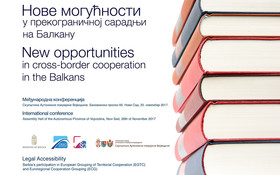The International Conference “New opportunities in cross-border cooperation in the Balkans” was held on 20th November 2017 in the Assembly of AP Vojvodina, organized by the Central European Service for Cross-Border Initiatives Balkans (CESCI Balkans) and Planta Association.

Director of CESCI Balkans, Mr Ervin Erős emphasized that the conference focuses on the legal accessibility of Serbia as part of European Grouping of Territorial Cooperation (EGTC) and Euroregional Cooperation Grouping (ECG), with the participation of representatives of the Council of Europe, the European Committee of the Regions (CoR), the Association of European Border Regions (AEBR), The Ministry of Foreign Affairs and the Ministry of Justice of Hungary, relevant ministries of the Republic of Serbia, representatives of the Provincial Government and the Assembly of the APV.
Welcoming the participants at the opening of the conference, the President of the Assembly of the Autonomous province of Vojvodina Mr István Pásztor pointed out that the National Assembly of the Republic of Serbia, at the beginning of February 2016, passed the Law on the confirmation of the European Outline Convention on Transfrontier Co-operation between Territorial Communities or Authorities, known as The Madrid Convention.
In the preamble to this Convention, priority areas of cooperation are regional, urban, rural development, environmental protection, improvement of public services and mutual assistance in emergency situations. “These are practical goals, whose accomplishment brings prosperity to citizens” Pastor said, adding that this Convention represents a framework for establishing and strengthening bilateral and trilateral forms of cooperation. President Pastor also pointed out that, as a next step, the legislation needs to be adopted compatibly with the Convention, which would become part of our legal system, establishing the right of local authorities to participate in cross-border projects and providing the possibility of financing the realization of these projects.
Ms Hajnalka Juhász, head of the ministerial cabinet, Ministry of Justice, Hungary, said that such conferences contribute to raising awareness about the importance of cross-border cooperation. She mentioned that Hungary was among the first countries of the European Union that joined the EGTC, and that a lot of efforts has been made to adjust the legal procedure, so that the processes of cross-border cooperation could be carried out smoothly, and that this work was done in cooperation between lower and national levels of government. She emphasized that these processes will contribute to the empowerment and acceleration of European integration of our country.
The conference was attended by the Vice-Presidents of the APV Assembly Ms Snezana Sedlar and Mr Aleksandar Djankovic, and the participants were also welcomed by the Ambassador Slobodan Vukcevic, Head of Department for neighboring countries and Southeast Europe at the Ministry of Foreign Affairs of the Republic of Serbia.
During the initial panels, the Head of the Council of Europe Office in Belgrade, Mr Tim Cartwright, the Secretary General of the Association of European Border Regions, Mr Martín Guillermo Ramírez, and the coordinator of the EGTC Platform Mr Slaven Klobučar addressed the panel. Mr Tim Cartwright emphasized the importance of cross-border cooperation for everyday life of citizens, while Mr Slaven Klobučar presented the topic of European grouping of territorial cooperation to participants of the conference. He pointed out that more than 1/3 EU citizens living in the bordering regions often encounter obstacles, whether it is finding a job, accessing healthcare, everyday travel, or overcoming administrative problems, and that a lot has been achieved in cross-border cooperation in Europe. He presented the EGTC as an instrument of cross-border cooperation with main benefits such as: permanence and stability, long-term strategic vision and less administration.

Participants also had the chance to learn about the best practices of institutionalized cross-border cooperation in Europe, like the cross-border hospital de Cerdanya (between Spain and France), presented by Ms Yolanda Puiggròs Jiménez de Anta – legal Expert of Roca Junyent; Pons Danubii EGTC from Slovakia presented by Mr Zoltán Bara, Director and the best examples of EGTCs from the border regions of Hungary, presented by Ms Abaffy Patricia.
The conference was closed with a panel entitled Legal Accessibility – Serbia’s participation in EGTC and ECG with the following main outputs:
The panelists were: Ms Ana Nikolov, Director of Planning, Central European Service for Cross-Border Initiatives Balkans/Director, AEBR Balkans; Ms Sanda Šimić, Ministry of European Integration, Government of the Republic of Serbia and Mr Gyula Ocskay, General Secretary, Central European Service for Cross-Border Intiatives.

Gallery: New opportunities in cross-border cooperation in the Balkans - International Conference
